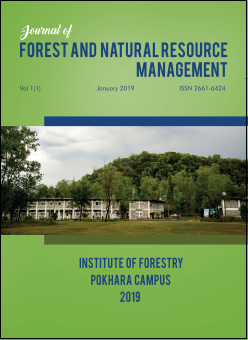Role of Biogas in Climate Change Mitigation and Adaptation
DOI:
https://doi.org/10.3126/jfnrm.v1i1.22649Keywords:
Climate Change, biogas, adaptive capacity, mitigationAbstract
The study was carried out to analyze the role of biogas in climate change mitigation and adaptation. The study is based on the perception of 108 households of Muralibhanjyang VDC of Dhading district, Nepal. The study showed that amount of greenhouse gas emission was reduced by 3.82 tons per household per year of carbon dioxide equivalent by reducing 65.10% of fuel wood consumption per household per year. It was found that biogas has an effective role in climate change mitigation by reducing greenhouse gases emission. On installing 352 biogas plants, the number of trees saved in VDC was estimated to be 4083 per year which helps in mitigation and adaptation too. Adaptive capacity was determined on the basis of five different assets by giving the index value for each indicator ranging from one to four, which indicates low to very high value. The indicators of adaptive capacity for human, natural and social assets were obtained with values 2, 3.2, 3 and 1.2, 2.3, 2.1 for biogas users and non-users respectively. The physical and financial assets were obtained similar for both users and non-users (i.e. 3). There was significant difference between the adaptive capacity of biogas users and non-users where the average adaptive capacity value for biogas users was found to be 3.24 (high) and that of non-users was 2.8 (medium to high). It can be said that biogas plays a significant role in climate change adaptation by increasing adaptive capacity.
Downloads
Downloads
Published
How to Cite
Issue
Section
License
© Institute of Forestry, Pokhara Campus




